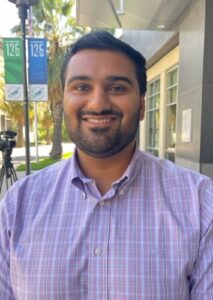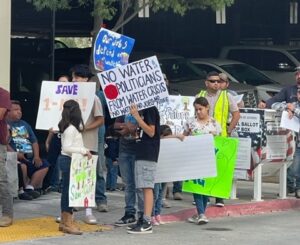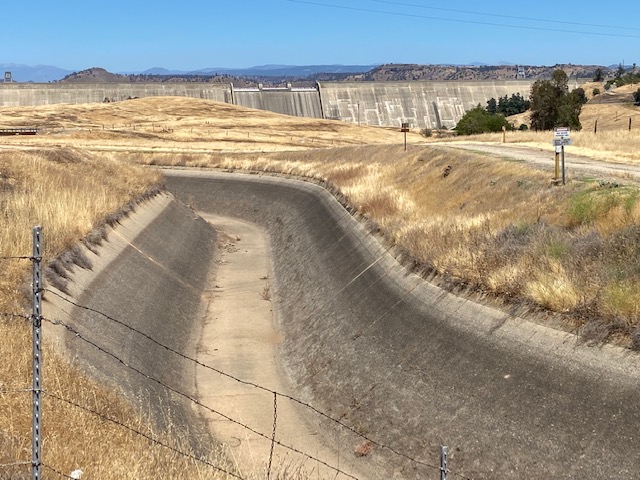
In front of a standing room only crowd, the Madera County supervisors met as the board of the Madera GSA on September 13, 2022, in the county office building. The key agenda item was consideration of penalties for growers who exceed their water allocations. Over a hundred farm workers and their families were on hand, coordinated by local labor contractors and grower Ralph Pistoresi. He has been vocal in his opposition to the per acre fees set in June to fund the groundwater sustainability plans (GSPs) in the subbasins covered by the GSA. In the hour before the meeting, a large group of farm workers had gathered outside the building to listen to several speakers say in English and Spanish that the county GSA program would ruin the ag industry and thereby threaten their jobs. A reporter and a camera operator from the Fresno Univision TV station were filming and interviewing.

Supervisor Tom Wheeler called the GSA meeting to order at 10:52 a.m. The meeting room was full with several hundred people including a number of children displaying “Save Our Farms” posters. In the lobby outside the meeting room, more than 50 watched the proceedings on a large TV screen carrying the Zoom webcast. The session lasted until nearly 4 p.m. with more than 30 people giving public comment, virtually all in opposition to the penalties. There was much criticism of Irriwatch, the satellite system being used to measure the amounts of water used on growers’ land which determine if allocations are being exceeded.
At the conclusion, the Board took no action, with Stephanie Anagnoson, Director of Water and Natural Resources, saying the staff would bring back an adjusted proposal at a special meeting to be held on September 27th.
Here’s How the Meeting Went
Ms. Anagnoson opened the session with a regular monthly update of GSA activities, but with a bit more background than usual, she said, because of the large number of people in attendance. Describing the status of the GSPs for the three subbasins, she said all are under review by the state but that it is required that the plans be followed even before approval. She said a revised GSP for the Chowchillas Subbasin was resubmitted on July 27th and it is hoped for a DWR response by the end of the year. Ditto for Delta-Mendota which was resubmitted on July 19th. For the Madera Subbasin, she is hopeful for a formal DWR response by the end of October.
She said the fees approved for Madera ($246 per irrigated acre) and D-M ($130) will appear on tax bills this fall, with 50 percent now and the other half in the spring. Because the 218 vote was rejected by property owners in the Chowchilla Subbasin, there are no fees to be applied, but more on the Chowchillas situation below.
She said there is a verification project underway to compare Irriwatch and metered results in a cooperative effort with 17 growers covering 12,000 acres and eight crops using 90 flow meters. This involves weekly site visits to record data. Final results are expected before the 2023 irrigation season with Irriwatch adjusting bare soil Evapotranspiration of Applied Water (ETAW) back to January 1, 2022. She reported on Prop 68 grant funded recharge projects underway. Two in Chowchilla totaling $7.4 million and two in Madera totaling nearly $4.75 million. Additional Prop 68 grant funds are being used to build monitoring wells covering the domestic well inventory in the GSA.
A $10 million grant has just been signed with funds to be used for multi-benefit land repurposing in all three subbasins. Land is to be taken out of irrigated production and instead used with a low water crop, alternative cover crops or wildlife refuge with land owners receiving reimbursement. There will be a land repurposing public workshop on September 20th from 3:00 until 4:30 p.m. at the Madera Farm Bureau office and on Zoom. She noted there is no funding source for this in Chowchilla. She said a smaller grant has been obtained to fund the Fairmead Resilience Project around that disadvantaged community and in partnership with Triangle-T Water District. She also noted that there would be more information forthcoming on the opportunities for public / private partnerships around recharge basins. She also said that the Chowchilla Water District would be the administrator of the domestic well mitigation program in that subbasin, even though there is no funding source at the moment for the $600,000. In Madera, the GSA will be responsible for 75 percent of the funding working with the other GSAs in the subbasin.
The Board Weighs In
Anagnoson concluded at 11:05 a.m. with discussion first from board members. Supervisor Brett Frasier asked if the grant funds for projects could be used to offset the fees being assessed property owners and the answer was yes, because there is annual review of GSA finances. Supervisor David Rogers said he was anxious to see budgets for the GSA projects. Anagnoson said they would be available “in a month or so.” Staff discussed the timing between grant funding and tax collection schedules.
Public Comment
At this point there was an invitation for public comment on Anagnoson’s report with Chair Wheeler noting a three-minute time limit for each speaker. Local grower Ralph Pistoresi was first to the microphone. He opened saying the grant funding looked to him like a piece of cheese put on a mousetrap, with the state offering some funds but with so much more then required of property owners. He pointed to the audience and said that the decisions to be made by the supervisors affected these people who would not be receiving those funds. He said the Board was going to put agriculture out of business in the county.
Noah Lopez of the Madera Ag Water Association (MAWA) focused on Irriwatch and its measurements of ETAW. He said, “We’ve tracked this and, in many cases, Irriwatch over-estimates water use by as much as 150 percent, especially with pistachios which is deep rooted. He said as the Board considers penalties it needs to watch accuracy very carefully. He asked the Board to consider a streamlined meters appeal process. He said his group had submitted a letter for an alternative meter process.
Sam Mascarenas is a local labor contractor here to support growers, he said. All these faces here know that without water there are no jobs. He paid tribute to the workers for working hard for their families. He said, if we take away growers’ water, we take away their ability to provide jobs. These people will be hurt the worst. He cautioned against unintended consequences of the fees and penalties. He said the problem with this state is a lack of vision. He said it could have turned high speed train project into water projects.
Speaking next was local grower Kevin Herman, who said Irriwatch is still “a mess.” He said it was important that the penalties not kick in until the 2023. He said the process for certifying flow meters and following the appeal process needs to be worked out in detail. He said if you really need the $246 per acre, he’s willing to support that but if it’s not all needed, the fees should be reduced. He said we need to work together to keep Sacramento out of this work here.
Ahmed Almari introduced himself as a local businessman, not a farmer, but he is an affected farm labor contractor and business owner. He said he has great concern with our future. He said he just built a warehouse for his farm supply products, and it is very clear that these penalties will affect his customers negatively. Farmers will come together to solve problems, but if we can’t unite locally, there is no way we can pursue at the state level.
Sylvia Lopez identified herself as a farm worker whose family came from Mexico 43 years ago, running from corruption. She said we’re here today to support growers. If they don’t do their investment, we won’t be able to feed our families. She said we were supposed to go to work today but came here so you’d hear our voices.
Michael Titus identified himself as attorney with the firm of Wild Carter & Tipton. (Their website bills them as the oldest law firm in Fresno.) He said his firm had filed suit on behalf the California Unified Water Coalition to invalidate the 218 vote that approved the GSA fees. He said these rates are special taxes disguised as fees. He said these unconstitutional rates will sink family farms. He said his firm also brought action under public records act for documentation of the mechanism the county used to prepare the 218 vote. He said the county did not provide the required information.
Jim Maxwell of Agriland Farming says his company farms extensively in Madera and neighboring counties. He said the workers attending the meeting are our people who make Madera. The issue isn’t about agriculture. It’s about the whole county, he said. If ag fails, everybody in Madera fails. Almond growers and walnut growers can’t break even. Low commodity prices, high fuel costs and drought are among the problems. The idea of paying another $246 is a back breaker. He said adjust the fee to the money you actually need. But you can’t do it right now. We farm in eight counties in the midst of many GSAs, and this [Madera GSA] is the most burdensome we face anywhere. We supported it so that you would continue to listen to us.
Grower Lynn Cedarquist said he farms pistachios in Madera. He said we worked to help with Stephanie [Anagnoson] to select Irriwatch. He said 2021 was to be a verification year but I was sounding alarm then because it was not working. Irriwatch recorded 16 inches more water used than what I actually put on my trees. He said the county has had a constant bias against water meters. He objected to the term “alleged violator” in the language of the draft proposal. He said his meters have been verified and now Irriwatch says, “I’m 25 percent over.” He said it showed a foot of water applied after harvest. He concluded saying I don’t think the county has a valid method for measuring water use.
Madera Farm Bureau Executive Director Christina Beckstead said she needed to reiterate the deficiencies of Irriwatch. Many of my growers have told me numbers are being over or under estimated. There is a disconnect between water use and ETAW. Growers know what they apply vs ET; those numbers are different. She said Irriwatch results don’t consider soil type and soil quality, or deficit irrigation. The only option growers have is an appeals process. She said that while the collection of fees has already been imposed, projects not being implemented should not be charged.
Sullivan Grosz with Pearson Realty asked if the board members realized what is this doing to land values in the county. He claimed land values are down 50 percent from eight years ago. He said we sell property across the state. He asked what will this drop in land values do to your county’s budgets?
Family farmer Robert Bishel said he had prepared his farm for all this, putting in wells, but he said he can’t prepare for a tax that will put us out of business. He said that sewage from cities is what kills fish in the rivers but that farmers always catch all the blame. If I’m paying something with no benefit, you’ll put me out of business. We care about our employees. You can push back against the state. Fix the sewage problem and stop taking water away from agriculture.
Identifying himself as a farm worker, labor contractor and small farm owner growing cherries, Oswaldo Valencia said these kids here are depending on you for their future. He said his father came from El Salvador and he was born in Guatemala, hoping for a better life in the U.S. You are affecting not just me but my kids and their future. He closed by saying please consider our children.
Gaston Cignetti said he is with an association of farm labor contractors. He said if farms go out of business, all the employees will continue to work but will have to find jobs farther away from Madera. Think about the farm employees, he said.
Martin Chavez with Pacific Farm Management said before you take your lunch break, look in this room… these are the people who feed America. When you vote on these steep penalties, you’re voting to put these people out of business. Go back to the drawing board. Rethink your approach. He says his people ask him if there will be jobs. He then spoke in Spanish to the audience, drawing applause.
The lunch break was announced just before noon and continuing until 1:15 p.m. It was noted all of this had been commenting on the staff report and that penalty resolutions would be considered in the afternoon session.
More Comment
Following the lunch break, a large crowd was still on hand but with a few empty seats and not so many in the lobby. Chair Wheeler said he wanted to recognize one Zoom participant who asked for time to comment. Jack Rice of the MAWA group acknowledged the difficulties of SGMA and the lack of support for fees or even the activities in the GSP. But he said the budgets need to be developed and made available. He said that while the verification project is ongoing, no one is sure what it is showing. He advocated a less adversarial approach for penalties.
Director Anagnoson replied that there is a budget for GSA projects in the rate study and it’s called the financial plan, citing the page number in the report. She said everyone understands that agriculture is the basis of the economy in Madera, but it seems like we are in a race to the bottom of the aquifer. She said SGMA is not the end of ag, but we need to manage differently.
Chowchilla
At that point she continued with a presentation on the Chowchilla Subbasin in light of the failed 218 vote. Her slides documented the many public meetings held the past three years leading to the submission of the GSP. In the Chowchilla Subbasin, costs included land repurposing, participation in Sites / water purchases, recharge, and domestic well mitigation. The total cost was $204/enrolled acre per year for the first five years.
She said, the Chowchilla GSP is currently under review with DWR, but that the plan is very vulnerable to being deemed inadequate because there is currently no funding mechanism in place for County GSA projects, namely domestic well mitigation, participation in Sites or other purchase of water, recharge and land repurposing. She said ALL GSAs are impacted and that State Board Intervention is possible in the Subbasin. She identified three options: Do nothing and keep the current allocation. Reduce the allocation for 2023 on some basis to be determined. Or option three, enter into MOU with a Chowchilla grower group to fund and implement the Revised GSP as submitted to DWR on July 27, 2022.
The obligations for the grower group would be to keep the allocation as is for 2023, provide immediate certainty on: (1) type of public agency to be formed, (2) funding, (3) mechanics of escrow account, (4) project management for completion of projects in the Revised GSP. She said there is not a menu of options to select from – a new entity must fund the entirety of the GSP, with funds deposited in an escrow account by December 15, 2022, for 50 percent of the rate that funds projects in GSP. She reminded the board that it is responsible for the GSP and funding until there is a new public agency.
The Supervisors Respond
Supervisor Rogers opened board comment saying the district he represents includes most of the ag in Madera including Chowchilla who turned down the 218. After additional comments about his support for ag, he advocated that the new group be given time to develop its organization. He said unless we save the groundwater, we can’t save agriculture and he believes people will do the right thing.
Chairman Wheeler recalled an effort in 2010 when he led the Board in trying to stop additional wells being drilled but that effort failed. Then Supervisor Frasier agreed that the Chowchilla group needs to be given time to do this.
Public Comment on Chowchilla

With the floor open to public comment, first was Karun Samran who said he was a grower speaking for the Chowchilla group. He said following the 218 vote, some 80 growers in Chowchilla gathered to consider next steps. There is a clear understanding that the vote did not mean SGMA goes away. An experienced consulting firm has been hired to assist them and legal counsel has been retained to guide in creating an suitable organization. He said at a meeting on August 11th some 80 percent of the white areas in Chowchillas were represented. There is a commitment to pay $600,000 into an escrow account by the December deadline. A letter detailing this has recently been submitted to the county. He said we understand we’re late to this party, but growers are committed to going forward.
Next was Ralph Pistoresi who said he farms 700 acres in the Chowchilla Subbasin. He said the proposed fee could not support all the projects and that the 218 has to give back to people a beneficial benefit. He also said the fees reduce property values by as much as $4,500 per acre.
Farm Bureau’s Beckstead acknowledged the Chowchilla group’s effort to decide their own fate. She also pointed out that Chair Wheeler’s well limitations had only been directed at agriculture, which created opposition.
Devin Aviles a grower who also heads a local farm supply co-op, said he supports the Chowchilla growers. He said, though, that if they don’t step up and catch up, the state may still come in.
Grower Cedarquist said he had attended the August 11 meeting in Chowchilla, but said he was skeptical of the cost and benefit of the Sites Dam commitment. He questions the premise that it is all or nothing and that recharge is very popular. He said a partnership between farmers and the county is a very rational choice.
Supervisor Letitia Gonzalez said she supports the Chowchilla group’s good faith efforts.
Returning to the microphone, Director Anagnoson explained the penalty process and rates, pointing out adjustments that had been made before this meeting in the language of the appeal process. She confirmed if approved they would not apply before 2023. Supervisor Frasier proposed a “laddering in” of the penalty rates with $100 the first year, $200 in the second, reaching the full $500 in year 2027, year five.
Rogers spoke again saying he realized penalties are needed for those who exceed their allocations but was extremely critical of Irriwatch, claiming it is not based on proven science. “It’s junk to me,” he said, drawing applause.
Anagnoson replied saying a way is needed to measure water use. She named Land IQ as another satellite service being used in the Valley. A system from NASA called Open ET is not yet operational. She said Irriwatch is as scientific as can be, that had had a “ream of studies.” Supervisor Rob Poythress said he had used information on his farm from 2021 and made management changes accordingly to reduce water use. He said what happens to those who have played by the rules… is there a benefit? Anagnoson said the unused allocation could be rolled over to the following year and that penalties have to go hand in hand with allocations. Frasier asked if growers could have the meters calibrated and certified before 2023 begins and the answer was yes but monthly readings would be needed.
More Public Comment
Again, with public comment invited, Subino Herrera, said he was a farmer in the Chowchilla Subbasin and was concerned about Irriwatch. He said the results were different from his meters. Sylvia Lopez returned to the microphone saying we are going to fight this until the end. Attorney Titus restated that the suit has been filed and he said he respectfully requests that penalties not be imposed. Pistoresi said that only one percent of the population are farmers anymore and that if they don’t have water, they can’t farm. He said there is no future if they are wiped out in the present.
Speaking for the first time, Michelle Lascoigty, Madera grower and rancher, said her family has been farming since the 1800’s, now employing a lot of people with good pay and benefits who work for a better life. She said she was speaking against the $246 fee, claiming that Madera County was running [with these programs] before it could barely walk. Grower Cedarquist citied work he has done with UC Davis professors on how winds affect Irriwatch results, which the company denies. Referring to the owner and founder of Irriwatch he said, “Wim is a good salesman.”
 Grower Larry Pietrowski said he farms in all four GSAs and object to the appeals process which costs $500 to bring. He said the required consultant is not named, the three-member appeals panel does not include a grower or a person with expertise. He asked that in last step, could he get a fair hearing in an appeal to the very Board that set the regulations. He said charging 10 percent interest on the penalties being contested was extreme.
Grower Larry Pietrowski said he farms in all four GSAs and object to the appeals process which costs $500 to bring. He said the required consultant is not named, the three-member appeals panel does not include a grower or a person with expertise. He asked that in last step, could he get a fair hearing in an appeal to the very Board that set the regulations. He said charging 10 percent interest on the penalties being contested was extreme.
Mickey Basra, a grower, said he came to the U.S. and began by driving a truck before being able to slowly acquire farmland. He said between low commodity prices and high on-farm costs, the GSA fees would make it impossible. He volunteered to travel to Sacramento with Supervisor Rogers to lobby state government officials. Beckstead supported Pietrowski’s comments and objected to the term “alleged violator” that appears in the draft regs. She also said it should be made clear whether the reference is to calendar year or water year.
Mike Alamon pointed out that if commodity prices return to higher levels, some growers will pump even with a fine imposed and treat it as a cost of doing business. So, water use won’t be restricted. He said a penalty should not be imposed at this time.
Speaking again, Devin Aviles thanked Stephanie [Anagnoson] for her hard work and asked for clarification between the 28 inches of water pumped is the same as ETAW calculated. Poythress said the previous speaker’s example is why penalties are needed if water is used over the allocation. He said we don’t get the choose which laws we abide by.
Madera Farm Bureau President and grower Michael Naito said that organization’s water committee had sent a letter a week ago to the county expressing concerns about Irriwatch results. He cited experience on his farm comparing meter results. How can you impose a penalty on something you can’t measure, he asked.
A Madera resident who said he had long experience in the ag community, Jack Machado, said he has watched the Valley deteriorate and he felt these fees would continue that decline.
Speaking online, MAWA’s Rice said penalties are fundamentally dependent on accuracy. He said Irriwatch seems to measure ET water but not ETAW. He asked that the appeal process be made less difficult and that there be clarification between the terms “to pump” versus ETAW. Two more speakers rounded out the public comment. Laura Gutile, a fourth generation farmer, said she had seen the heartbreak when her father and brothers had sold their 2,500 acres, got out of farming and moved out of California. She remained with her 18 acres and hoped she could continue but was concerned when her daughter asked about carrying on the family tradition. Finally, Haig Der Torossan introduced himself as the oldest in the room at age 87. He said weather and nature provide plenty of penalties for farmers and he hates to see humans doing it now. He drew applause when he said that the people in the room will provide the answers if given the opportunity.
Supervisor Poythress provided a fitting benediction to all this heartfelt discussion by pointing out that growers in irrigation districts have been paying for water for years to develop the necessary infrastructure. He said he paid $225 per a/f this year as a Madera Irrigation District member and received his allocation of pure water. He said he had not heard any complaints all day from growers who have had to lower wells or put in new ones as water levels drop and salt water is brought up. He asked how many have had to do this in the past couple of years… and there was a small show of hands.
“If we don’t do something, we won’t have water,” he said. He has taken out trees in his white area land and it hurts, he agreed. He noted that Jim Maxwell said earlier that the Madera fees are the highest… he said that’s because Madera has projects. We can’t wait any longer, he finished up. He too drew applause when Chair Wheeler asked for it.
At that point it was announced that no vote would be taken now with the Board to meet again on September 27th. Director Anagnoson said the penalty resolution would be adjusted to deal with the term “alleged violator,” meters, ET vs ETAW vs AW, and with no imposition of penalties for 2023.
Pro Tem Chair Frasier acknowledged with thanks the public input pointing out this is one more reason to keep SGMA projects local. The meeting ended at 3:54 p.m.
DISCLAIMER OF RESPONSIBILITY; Waterwrights strives to provide clients with the most complete, up-to-date, and accurate information available. Nevertheless, Waterwrights does not serve as a guarantor of the accuracy or completeness of the information provided, and specifically disclaims any and all responsibility for information that is not accurate, up-to-date, or complete. Waterwrights’ clients therefore rely on the accuracy, completeness and timeliness of information from Waterwrights entirely at their own risk. The opinions expressed in this report are those of the author and do not represent any advertisers or third parties.
ALL RIGHTS RESERVED. Copyright 2020 by WaterWrights.net
Madera County is comprised of three subbasins, designated by the CA Department of Water Resources as critically overdrafted, and “high priority”: (1) the Chowchilla Subbasin; (2) the Madera Subbasin; and (3) a portion of the Delta-Mendota Subbasin. Each of these subbasins submitted a Groundwater Sustainability Plan (GSP) by January 31, 2020. These subbasins are required to achieve “sustainability” by the year 2040. The method by which sustainability will be achieved will be illustrated in the GSP, which was be drafted in partnership by the irrigation district, water districts, cities and Madera County. The Madera County Groundwater Sustainability Agency (GSA) is administered by the Madera County Department of Water and Natural Resources: Stephanie Anagnoson, Director, 200 W. Fourth Street, Madera, CA 93637, (559) 675-7703 x. 2265 or (559) 675-6573. The County of Madera Board of Supervisors is the Board of Directors of the GSAs for the three subbasins. The current board is composed of five members: Brett Frazier, Letitia Gonzalez, Robert Poythress, David Rogers and Tom Wheeler, chair.
































